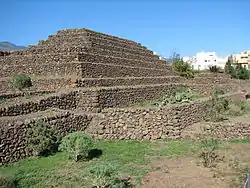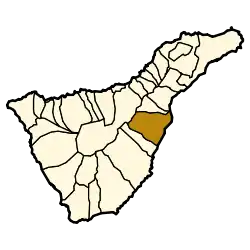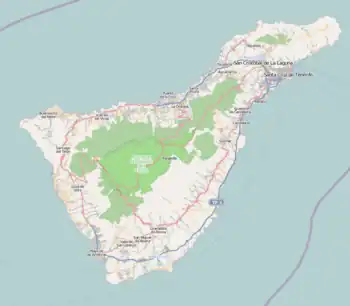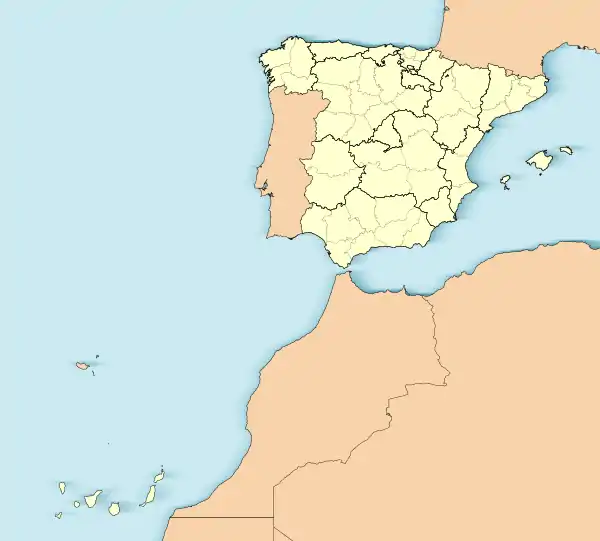Güímar
Güímar (Spanish pronunciation: [ˈgwimaɾ]) is the name of a municipality, town and valley in the eastern part of the Spanish island of Tenerife, one of the Canary Islands, and part of Santa Cruz de Tenerife (province). The municipality extends for 102.9 square kilometers from the mountainous interior to the beaches on the Atlantic, and borders the municipalities of La Orotava, Arafo and Fasnia. Its estimated population is 18,589 (2013). The TF-1 motorway passes through the municipality.
Güímar | |
|---|---|
 | |
 Flag .svg.png.webp) Coat of arms | |
 Municipal location in Tenerife | |
 Güímar Location in Tenerife  Güímar Güímar (Canary Islands)  Güímar Güímar (Spain, Canary Islands) | |
| Coordinates: 28°18′54″N 16°24′36″W | |
| Country | |
| Autonomous Community | |
| Province | Tenerife |
| Island | Tenerife |
| Government | |
| • Mayor | Carmen Luisa Castro Dorta (PP) |
| Area | |
| • Total | 102.9 km2 (39.7 sq mi) |
| Elevation (AMSL) | 289 m (948 ft) |
| Population (2018)[1] | |
| • Total | 19,739 |
| • Density | 190/km2 (500/sq mi) |
| Time zone | UTC+0 (CET) |
| • Summer (DST) | UTC+1 (CEST (GMT +1)) |
| Postal code | 38500 |
| Area code | +34 (Spain) + 922 (Tenerife) |
| Climate | BSh |
| Website | www.guimar.es |
The municipality is famous for its pyramids. It is also the location of the barranco de Badajoz. A portion of its volcanic landscape has been set aside as the Nature reserve of Malpaís of Güímar, its highest point being Montaña Grande.

Name
The name comes from Guanche and is thought to mean 'angle, corner, nook'.[2]
History
The first population centre of Güímar originated in the sixteenth century in the neighbourhood of San Juan - also called Güímar de Arriba - near the springs of the Agua and Chamoco ravines. The first buildings were linked to the sugar mill started up by the brothers Juan Felipe and Blasino Piombino or Romano.
Climate
| Climate data for Güímar (altitude: 289 metres (948 feet)) | |||||||||||||
|---|---|---|---|---|---|---|---|---|---|---|---|---|---|
| Month | Jan | Feb | Mar | Apr | May | Jun | Jul | Aug | Sep | Oct | Nov | Dec | Year |
| Average high °C (°F) | — | 18.7 (65.7) |
19.9 (67.8) |
20.7 (69.3) |
21.8 (71.2) |
23.8 (74.8) |
26.3 (79.3) |
27.5 (81.5) |
26.1 (79.0) |
24.5 (76.1) |
21.4 (70.5) |
19.5 (67.1) |
22.4 (72.3) |
| Daily mean °C (°F) | 15.4 (59.7) |
15.6 (60.1) |
16.5 (61.7) |
17.1 (62.8) |
18.1 (64.6) |
20.1 (68.2) |
22.3 (72.1) |
23.1 (73.6) |
22.5 (72.5) |
21.0 (69.8) |
18.4 (65.1) |
16.4 (61.5) |
18.9 (66.0) |
| Average low °C (°F) | 12.4 (54.3) |
12.5 (54.5) |
13.1 (55.6) |
13.5 (56.3) |
14.5 (58.1) |
16.5 (61.7) |
18.3 (64.9) |
18.8 (65.8) |
18.9 (66.0) |
17.5 (63.5) |
15.4 (59.7) |
13.4 (56.1) |
15.4 (59.7) |
| Average rainfall mm (inches) | 57 (2.2) |
45 (1.8) |
40 (1.6) |
20 (0.8) |
9 (0.4) |
4 (0.2) |
1 (0.0) |
1 (0.0) |
7 (0.3) |
37 (1.5) |
67 (2.6) |
73 (2.9) |
361 (14.3) |
| Source: Climate-Data.org[3] | |||||||||||||
References
- Municipal Register of Spain 2018. National Statistics Institute.
- Álvarez Delgado, Juan (1985). "La división de la isla de Tenerife en nueve reinos". Anuario de estudios atlánticos (31). ISSN 0570-4065.
- "Clima Güímar: Temperatura, Climograma y Tabla climática para Güímar - Climate-Data.org". es.climate-data.org.